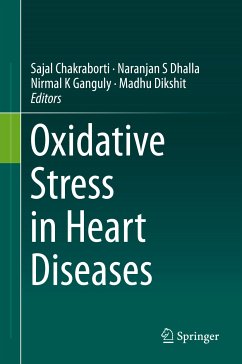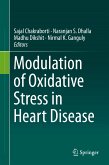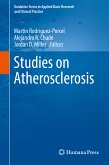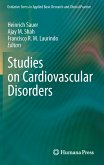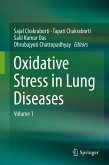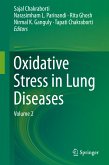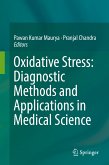Oxidative Stress in Heart Diseases (eBook, PDF)
Redaktion: Chakraborti, Sajal; Dikshit, Madhu; Ganguly, Nirmal K; Dhalla, Naranjan S


Alle Infos zum eBook verschenken

Oxidative Stress in Heart Diseases (eBook, PDF)
Redaktion: Chakraborti, Sajal; Dikshit, Madhu; Ganguly, Nirmal K; Dhalla, Naranjan S
- Format: PDF
- Merkliste
- Auf die Merkliste
- Bewerten Bewerten
- Teilen
- Produkt teilen
- Produkterinnerung
- Produkterinnerung

Hier können Sie sich einloggen

Bitte loggen Sie sich zunächst in Ihr Kundenkonto ein oder registrieren Sie sich bei bücher.de, um das eBook-Abo tolino select nutzen zu können.
This book bridges the gap between fundamental and translational research in the area of heart disease. It describes a multidisciplinary approach, and demonstrates biochemical mechanisms associated with dysregulation of redox signaling, which leads heart disease. Presenting recent studies on improved forms of ROS scavenging enzymes; specific inhibitors for different ROS generating enzymes; and oxidant induced signaling pathways and their antagonists that allow subtle modulation of redox signaling, it also discusses the spatial and temporal aspects of oxidative stress in the cardiovascular…mehr
- Geräte: PC
- ohne Kopierschutz
- eBook Hilfe
- Größe: 12.18MB
![Modulation of Oxidative Stress in Heart Disease (eBook, PDF) Modulation of Oxidative Stress in Heart Disease (eBook, PDF)]() Modulation of Oxidative Stress in Heart Disease (eBook, PDF)161,95 €
Modulation of Oxidative Stress in Heart Disease (eBook, PDF)161,95 €![Studies on Atherosclerosis (eBook, PDF) Studies on Atherosclerosis (eBook, PDF)]() Studies on Atherosclerosis (eBook, PDF)73,95 €
Studies on Atherosclerosis (eBook, PDF)73,95 €![Oxidative Stress in Cardiovascular-Metabolic Diseases (eBook, PDF) Oxidative Stress in Cardiovascular-Metabolic Diseases (eBook, PDF)]() Oxidative Stress in Cardiovascular-Metabolic Diseases (eBook, PDF)161,95 €
Oxidative Stress in Cardiovascular-Metabolic Diseases (eBook, PDF)161,95 €![Studies on Cardiovascular Disorders (eBook, PDF) Studies on Cardiovascular Disorders (eBook, PDF)]() Studies on Cardiovascular Disorders (eBook, PDF)161,95 €
Studies on Cardiovascular Disorders (eBook, PDF)161,95 €![Oxidative Stress in Lung Diseases (eBook, PDF) Oxidative Stress in Lung Diseases (eBook, PDF)]() Oxidative Stress in Lung Diseases (eBook, PDF)161,95 €
Oxidative Stress in Lung Diseases (eBook, PDF)161,95 €![Oxidative Stress in Lung Diseases (eBook, PDF) Oxidative Stress in Lung Diseases (eBook, PDF)]() Oxidative Stress in Lung Diseases (eBook, PDF)161,95 €
Oxidative Stress in Lung Diseases (eBook, PDF)161,95 €![Oxidative Stress: Diagnostic Methods and Applications in Medical Science (eBook, PDF) Oxidative Stress: Diagnostic Methods and Applications in Medical Science (eBook, PDF)]() Oxidative Stress: Diagnostic Methods and Applications in Medical Science (eBook, PDF)73,95 €
Oxidative Stress: Diagnostic Methods and Applications in Medical Science (eBook, PDF)73,95 €-
-
-
Dieser Download kann aus rechtlichen Gründen nur mit Rechnungsadresse in A, B, BG, CY, CZ, D, DK, EW, E, FIN, F, GR, HR, H, IRL, I, LT, L, LR, M, NL, PL, P, R, S, SLO, SK ausgeliefert werden.
- Produktdetails
- Verlag: Springer Nature Singapore
- Seitenzahl: 596
- Erscheinungstermin: 6. November 2019
- Englisch
- ISBN-13: 9789811382734
- Artikelnr.: 58416591
- Verlag: Springer Nature Singapore
- Seitenzahl: 596
- Erscheinungstermin: 6. November 2019
- Englisch
- ISBN-13: 9789811382734
- Artikelnr.: 58416591
- Herstellerkennzeichnung Die Herstellerinformationen sind derzeit nicht verfügbar.
